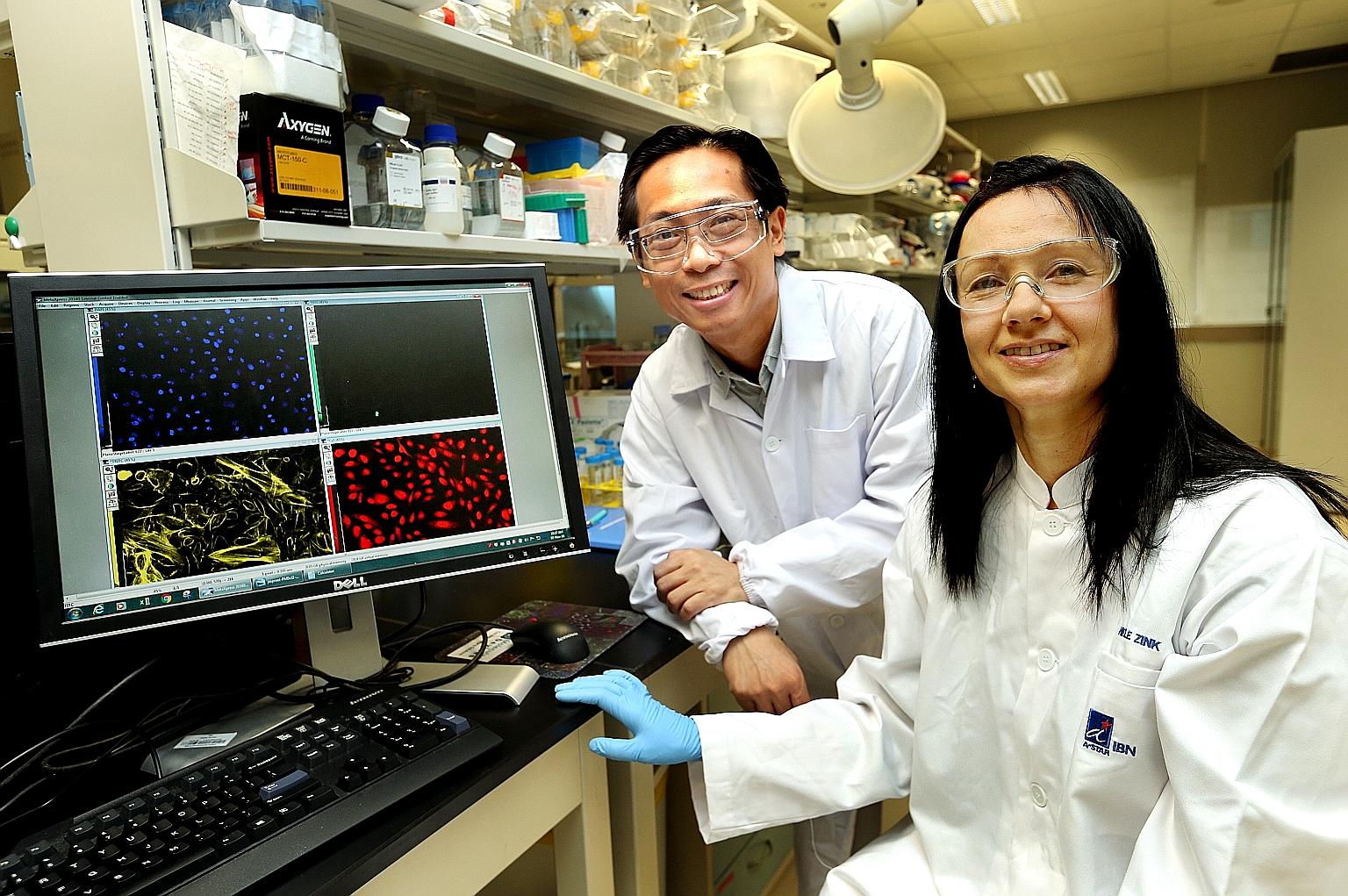Scientists win prize for animal-free test
S'pore team bags Lush Prize for alternative method to test chemicals on human kidney
Sign up now: Get ST's newsletters delivered to your inbox

Dr Loo Lit Hsin and Dr Daniele Zink from A*Star received the Lush Prize for Science on Friday in London for developing an animal-free automated procedure to predict the toxic effects of chemicals on the human kidney.
ST PHOTO: LAU FOOK KONG
Two Singapore scientists have become the first from Asia to win a prestigious award for their efforts to eradicate animal testing.
Dr Daniele Zink and Dr Loo Lit Hsin from the Agency for Science, Technology and Research (A*Star) developed an animal-free automated procedure to predict the toxic effects of chemicals on the human kidney.
The procedure is a world-first - the only previous option was to test chemicals on animals.
Both researchers were awarded the Lush Prize for Science on Friday, at the 2016 Lush Prize Awards Dinner in London.
The prize, now in its fifth year, has five categories, including science and lobbying, and is awarded jointly by British cosmetics company Lush, and non-profit research group Ethical Consumer.
-
How it works
Researchers made kidney cells from human induced pluripotent stem cells, which are capable of turning into any type of cell. Kidney cells were also isolated from human tissue. Different chemicals such as those found in anti-cancer drugs were then added to the kidney cells and incubated overnight to observe their toxicity.
In developing the procedure, the scientists screened more than 25,000 images of two million kidney cells - for their reactions to 44 different chemicals.
These included industrial chemicals, antibiotics and agricultural chemicals.
The effects of different chemicals and their effects on humans are analysed using an automated procedure which can look at more than 100 changes in the kidney cells simultaneously using image analysis.
It is the largest prize fund for the complete replacement of animal experiments, and has awarded a total of £1.5 million (S$2.67million) to groups or individuals working in the field of cruelty-free scientific research, awareness raising and lobbying since 2012.
Dr Zink and Dr Loo told The Sunday Times that they did not set out to develop animal-free testing methods, but it became a scientific challenge that they encountered in the course of their work.
"Five years ago, when we started testing nanomaterials on human cells, I became aware that there are no good in-vitro predictive methods," said Dr Zink, principal research scientist and team leader at A*Star's Institute of Bioengineering and Nanotechnology.
"The result of this makes me really happy. For ethical and scientific reasons, animal-free methods are very important."
By isolating kidney cells from humans and producing them from stem cells, Dr Zink and Dr Loo found - with about 90 per cent accuracy - the toxicity of 44 chemicals on kidney cells. The chemicals included antibiotics and agricultural chemicals. Accuracy was determined by comparing the test results with the effects of the chemicals on the kidney, as previously documented in scientific papers.
They also developed an automated process that enables them to analyse the effects on humans.
Dr Loo, principal investigator from A*Star's Bioinformatics Institute, said: "The more I worked on this, the more I realised that animal models are very inaccurate in that they cannot fully reflect human physiology. This gave me the motivation to work much harder in developing the technology."
While the accuracy of toxicity tests for the kidney in animal experiments is not known, the accuracy of animal tests in general is about 60 per cent, said Dr Loo.
The recognition is timely as countries around the world are looking to put a stop to animal testing.
The European Union, for instance, has banned the testing of cosmetic ingredients on animals.
Lush Prize judge Gill Langley said that originality of research and its impact were some of the things that judges looked for when deciding on the winners.
"What really struck me was that they (the Singapore scientists) had achieved a lot in such a short time," said Dr Langley, who is the senior science adviser for Humane Society International, an animal welfare group. "Some non-animal tests in toxicity have taken years and years to be developed, and even then, there is a lot of resistance from scientists in accepting them."
The research team, which beat seven other nominees, shares the prize with Professor Marcel Leist, from the University of Konstanz in Germany, who developed neuronal tissues that allow predictions of chemical effects on normal brain development.
The Singapore scientists will receive a trophy and share the prize money of £50,000 (S$86,200) with him.
WATCH THE VIDEO
Meet Dr Daniele Zink and Dr Loo Lit Hsin. Go to http://str.sg/4gD5


